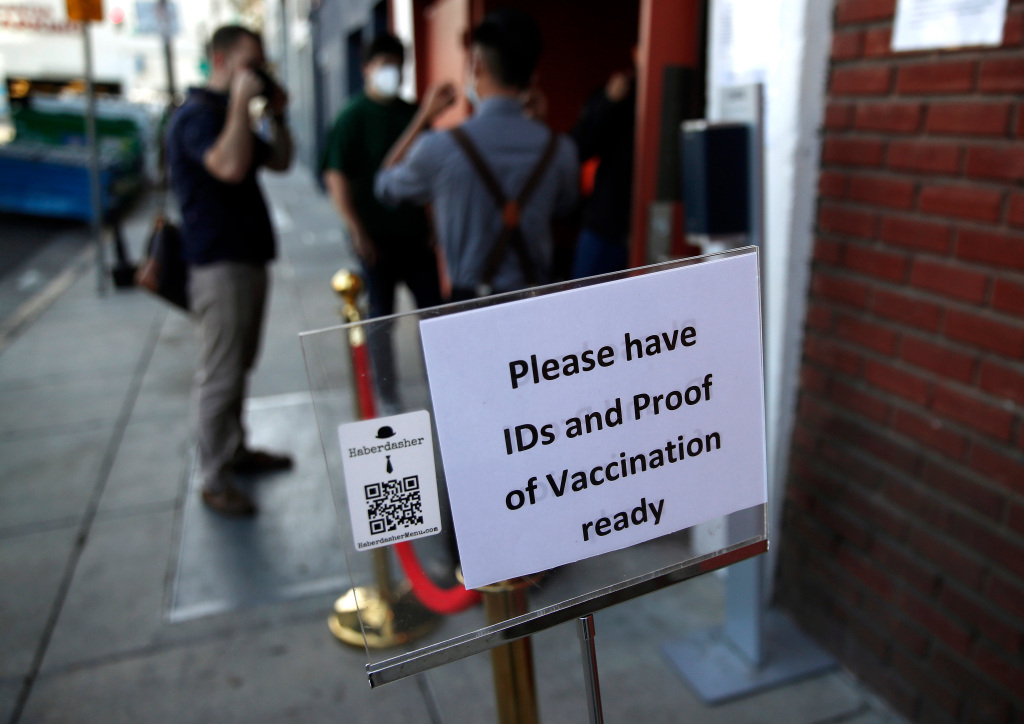OAKLAND — People dining inside restaurants or going to gyms, concert venues or museums, assisted living homes, senior centers will have to show proof that they’ve been vaccinated against COVID-19 under an emergency ordinance approved by the City Council Tuesday.
The ordinance requires adults to show their vaccine card and ID inside places where food or drinks are served, at entertainment venues, museums, recreational centers, fitness studios, assisted living homes, senior centers, and Oakland City Hall.
The requirement to be vaccinated also applies to kids 12 and older, but they will not be required to show identification as adults do.
People will have to start showing their proof of vaccination at those indoor locations on Feb. 1. By Jan. 15, the locations covered by the ordinance will have to have signs to warn patrons of the upcoming requirement.
“The purpose is to encourage more people to get vaccinated, increase our vaccination rate in Oakland and reduce the spread (of COVID-19) from unvaccinated people in indoor locations,” said Councilmember Dan Kalb, who authored the ordinance.
The ordinance is similar to ones adopted recently by San Francisco and Contra Costa counties and the city of Berkeley.
But Alameda County has not issued a vaccine mandate, which is why Kalb moved forward with one for Oakland.
“We support getting as many county residents vaccinated as possible,” county Health Officer Dr. Nicholas Moss told this news organization last week when asked about his decision thus far to refrain from issuing a mandate. “The biggest challenge for us is that Alameda County is a very big county with a lot of cities. It would be a heavy lift to support all the small businesses to implement this.”
Moss said the idea of having to beef up enforcement mechanisms was a deterrent for the county.
In Oakland, the city’s code enforcement team will be in charge of responding to complaints about businesses that don’t check customers’ vaccine proof and could issue fines for businesses that repeatedly flout the requirement to check customers’ vaccine status.
Dozens of people called in to voice opposition to the mandate — mostly those who said they oppose the vaccines overall.
But some councilmembers and city staff expressed hesitation about imposing a vaccine mandate for entrance to public services, like libraries, as well as dental offices — both of which were covered by the draft ordinance that was introduced Tuesday.
“Knowing we have a quarter of Oakland population not vaccinated — many Black and Latino residents — I have a concern we’d be limiting access to public facilities,” said City Administrator Ed Reiskin. “It would seem inconsistent to the public service ethic of letting everyone in.”
City councilmembers were hesitant to put up barriers to accessing health care at dental offices.
Kalb pointed out that the exemptions under the draft ordinance allowed unvaccinated people to show negative COVID tests in lieu of vaccine proof to enter dentist offices, and that dental emergencies — as defined by a dentist — would be exempt, but ultimately, the rest of the council removed the mention of dental offices and public libraries from the ordinance.
There are still exemptions: unvaccinated people will be able to dine indoors and go to gyms or large indoor events as long as they have a doctor-verified medical exemption and a recent negative COVID-19 test. And they can dine outside at restaurants, with brief trips inside to pick up food, pay or use the bathroom.
Darlene Flynn, executive director of the city’s Race and Equity Department, advised the council that one way to help mitigate the barriers of the ordinance would be to put up more information about where to access vaccines and for the city to provide more access to drop-in vaccine clinics.
Registering for vaccine appointments online has been a deterrent for some in getting vaccinated, she said.
To that end, the City Council added an amendment to the ordinance that directs the City Administrator to explore adding three additional vaccine clinics in the city.
“Overall, this is a victory for public health,” Kalb told this news organization after the vote.



















